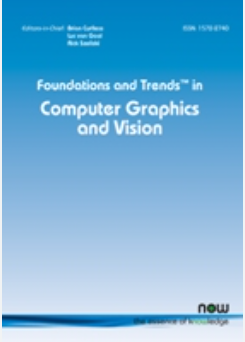多视图立体:教程
IF 9.3
Q2 COMPUTER SCIENCE, INTERDISCIPLINARY APPLICATIONS
引用次数: 492
摘要
本教程介绍了多视图立体领域的动手视图,重点是实用算法。多视图立体算法能够仅从图像构建高度详细的3D模型。他们采用可能非常大的图像集,并在一些合理的假设(最重要的是场景刚性)下构建一个合理的3D几何结构来解释这些图像。本教程将多视图立体问题定义为图像/几何一致性优化问题。它详细描述了其主要的两个组成部分:光度一致性措施的鲁棒实现和高效的优化算法。然后介绍了这些主要成分如何被一些最成功的算法使用,应用到实际应用中,并作为产品部署到行业中。最后介绍了利用领域特定知识(如结构先验)的更先进的方法,并概述了仍然存在的挑战和未来的研究方向。本文章由计算机程序翻译,如有差异,请以英文原文为准。
Multi-View Stereo: A Tutorial
This tutorial presents a hands-on view of the field of multi-view stereo with a focus on practical algorithms. Multi-view stereo algorithms are able to construct highly detailed 3D models from images alone. They take a possibly very large set of images and construct a 3D plausible geometry that explains the images under some reasonable assumptions, the most important being scene rigidity. The tutorial frames the multiview stereo problem as an image/geometry consistency optimization problem. It describes in detail its main two ingredients: robust implementations of photometric consistency measures, and efficient optimization algorithms. It then presents how these main ingredients are used by some of the most successful algorithms, applied into real applications, and deployed as products in the industry. Finally it describes more advanced approaches exploiting domain-specific knowledge such as structural priors, and gives an overview of the remaining challenges and future research directions.
求助全文
通过发布文献求助,成功后即可免费获取论文全文。
去求助
来源期刊

Foundations and Trends in Computer Graphics and Vision
COMPUTER SCIENCE, INTERDISCIPLINARY APPLICATIONS-
CiteScore
31.20
自引率
0.00%
发文量
1
期刊介绍:
The growth in all aspects of research in the last decade has led to a multitude of new publications and an exponential increase in published research. Finding a way through the excellent existing literature and keeping up to date has become a major time-consuming problem. Electronic publishing has given researchers instant access to more articles than ever before. But which articles are the essential ones that should be read to understand and keep abreast with developments of any topic? To address this problem Foundations and Trends® in Computer Graphics and Vision publishes high-quality survey and tutorial monographs of the field.
Each issue of Foundations and Trends® in Computer Graphics and Vision comprises a 50-100 page monograph written by research leaders in the field. Monographs that give tutorial coverage of subjects, research retrospectives as well as survey papers that offer state-of-the-art reviews fall within the scope of the journal.
 求助内容:
求助内容: 应助结果提醒方式:
应助结果提醒方式:


